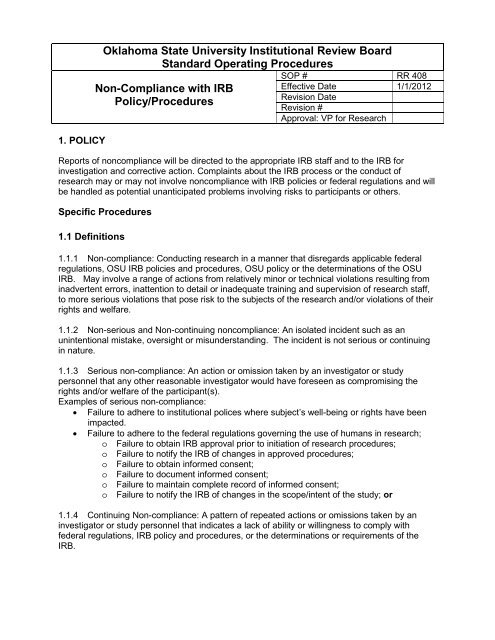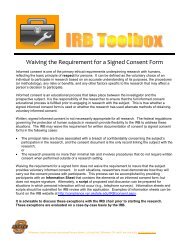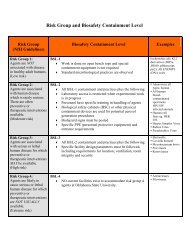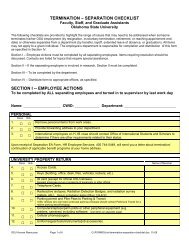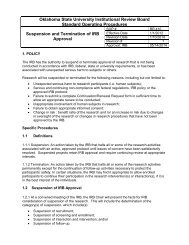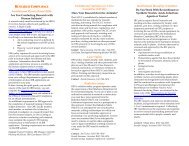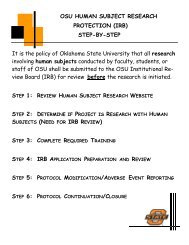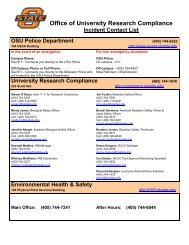Oklahoma State University Institutional Review Board
Oklahoma State University Institutional Review Board
Oklahoma State University Institutional Review Board
You also want an ePaper? Increase the reach of your titles
YUMPU automatically turns print PDFs into web optimized ePapers that Google loves.
1. POLICY<br />
<strong>Oklahoma</strong> <strong>State</strong> <strong>University</strong> <strong>Institutional</strong> <strong>Review</strong> <strong>Board</strong><br />
Standard Operating Procedures<br />
Non-Compliance with IRB<br />
Policy/Procedures<br />
SOP # RR 408<br />
Effective Date 1/1/2012<br />
Revision Date<br />
Revision #<br />
Approval: VP for Research<br />
Reports of noncompliance will be directed to the appropriate IRB staff and to the IRB for<br />
investigation and corrective action. Complaints about the IRB process or the conduct of<br />
research may or may not involve noncompliance with IRB policies or federal regulations and will<br />
be handled as potential unanticipated problems involving risks to participants or others.<br />
Specific Procedures<br />
1.1 Definitions<br />
1.1.1 Non-compliance: Conducting research in a manner that disregards applicable federal<br />
regulations, OSU IRB policies and procedures, OSU policy or the determinations of the OSU<br />
IRB. May involve a range of actions from relatively minor or technical violations resulting from<br />
inadvertent errors, inattention to detail or inadequate training and supervision of research staff,<br />
to more serious violations that pose risk to the subjects of the research and/or violations of their<br />
rights and welfare.<br />
1.1.2 Non-serious and Non-continuing noncompliance: An isolated incident such as an<br />
unintentional mistake, oversight or misunderstanding. The incident is not serious or continuing<br />
in nature.<br />
1.1.3 Serious non-compliance: An action or omission taken by an investigator or study<br />
personnel that any other reasonable investigator would have foreseen as compromising the<br />
rights and/or welfare of the participant(s).<br />
Examples of serious non-compliance:<br />
• Failure to adhere to institutional polices where subject’s well-being or rights have been<br />
impacted.<br />
• Failure to adhere to the federal regulations governing the use of humans in research;<br />
o Failure to obtain IRB approval prior to initiation of research procedures;<br />
o Failure to notify the IRB of changes in approved procedures;<br />
o Failure to obtain informed consent;<br />
o Failure to document informed consent;<br />
o Failure to maintain complete record of informed consent;<br />
o Failure to notify the IRB of changes in the scope/intent of the study; or<br />
1.1.4 Continuing Non-compliance: A pattern of repeated actions or omissions taken by an<br />
investigator or study personnel that indicates a lack of ability or willingness to comply with<br />
federal regulations, IRB policy and procedures, or the determinations or requirements of the<br />
IRB.
1.2 Reporting Allegations of Noncompliance<br />
1.2.1 Anyone inside or outside the university community may submit allegations of<br />
noncompliance to the IRB Chair, IRB members, IRB staff or the Office of <strong>University</strong> Research<br />
Compliance verbally or in writing. The IRB will maintain the confidentiality of the individual<br />
making the report to the extent possible.<br />
1.2.2 Information regarding noncompliance in research studies involving human subjects may<br />
come to the attention of the IRB through several additional means:<br />
• New applications<br />
• Continuing review<br />
• Internal audits<br />
• Adverse event reports<br />
• Reports from collaborators<br />
1.3 Processing the Allegation of Noncompliance<br />
1.3.1 Screening and Initial <strong>Review</strong> of the allegation:<br />
The IRB Manager screens the allegation to determine if it involves an active protocol. If an<br />
active protocol is involved the IRB Manager determines the source of funding, if any, and if<br />
there are any issues pertinent to other research review committees (IACUC, IBC, RSC, Laser).<br />
The IRB Manager, in consultation with the IRB Chair, will review the allegation to allow an<br />
initial determination of the nature and seriousness of the alleged noncompliance. This may<br />
involve discussion with the research team, research participants, and the complainant (if<br />
not anonymous) and others as needed. The IRB Manager will document and compile the<br />
information into a summary report. Investigator noncompliance may often be the result of<br />
communication difficulties, therefore the IRB will attempt to resolve apparent instances of<br />
noncompliance without interrupting the conduct of the study, especially if the rights and<br />
welfare of the subjects may be jeopardized by more invasive action on the part of the IRB.<br />
1.3.2 Determinations<br />
After the initial review, the IRB Manager and the IRB Chair will determine whether:<br />
• the allegation was false;<br />
• the non-compliance is not serious and not continuing; or<br />
• the non-compliance might be serious or continuing.<br />
False allegation:<br />
If the IRB Manager and the IRB Chair determine that the allegation of non-compliance is false,<br />
then the matter will be documented for the protocol file, if appropriate, the IRB Manager or IRB<br />
Chair will communicate the decision to the complainant (if their identity is known) and to the<br />
investigator. The information will be included in the IRB agenda as an information item.<br />
Not serious and not continuing:<br />
If it is determined by the IRB Manager and the IRB Chair that the allegation is not serious and<br />
not continuing, the investigator will be notified in writing by the IRB Coordinator or the IRB Chair.<br />
In addition, the IRB Manager or IRB Chair will discuss the issue with the investigator and, if the<br />
investigator is a student, their advisor, and an action plan will be drafted. The final action plan<br />
will be forwarded to the investigator via letter or e-mail and the information will be included in the<br />
IRB agenda as an information item.<br />
Noncompliance that may be serious or continuing:
If the allegation of noncompliance is considered to be serious and/or continuing, and involves an<br />
active protocol, the IRB Manager, IRB Chair and Asst. VP for Compliance will determine<br />
if immediate suspension of study procedures and/or enrollment is required for the protocol in<br />
question as well as for other protocols being conducted by the same investigator. The<br />
investigator(s) involved in the allegations, associated research staff, appropriate department<br />
heads, college research deans and the institutional official are notified in writing about any<br />
suspension. Further investigation and review by the convened IRB will determine the length of<br />
any suspension.<br />
If, after initial screening, the allegation of noncompliance is considered to be serious and/or<br />
continuing, the IRB will initiate an inquiry. The purpose of the inquiry is fact-finding and may<br />
involve examination of study records, discussion with the research team, personnel, research<br />
participants, witnesses, the complainant (if not anonymous) and others as needed. The IRB<br />
Chair may appoint one or more voting member(s) to assist in the gathering of information<br />
pertaining to the nature of the allegation.<br />
The investigator will be notified of the inquiry by the IRB Manager or the IRB Chair by phone<br />
call, letter, or e-mail and asked to respond in writing to the allegation within 14 consecutive<br />
days. If the investigator needs more time, an extension may be granted by the IRB Chair. The<br />
IRB Manager will document and compile the information, including the investigator’s response,<br />
into a summary report.<br />
The summary report will be presented to the IRB at a convened meeting for review. Depending<br />
on the response, the investigator may be asked by the IRB Manager or IRB Chair to attend the<br />
IRB meeting.<br />
1.3.3 <strong>Review</strong> Procedures for Serious and/or Continuing Noncompliance<br />
The allegation and inquiry results will be presented at the next scheduled convened IRB<br />
meeting. For urgent issues, the IRB Chair may convene an emergency meeting of the IRB.<br />
At the convened IRB meeting, the IRB Chair will present the allegation(s) to the IRB. All IRB<br />
members will receive the investigation report, synopses of any communication with the<br />
investigator, the last approved IRB application or continuation, the approved consent,<br />
protocol and any other pertinent information. All members attending the IRB meeting will<br />
review all the documents and determine whether:<br />
• There is no issue of serious and continuing non-compliance.<br />
• There is serious and continuing non-compliance.<br />
• More information is needed and determination is deferred to future meeting pending<br />
receipt of additional information.<br />
1.3.4 <strong>Review</strong> Outcomes/IRB Actions<br />
The convened IRB makes the final determination whether the alleged noncompliance is<br />
serious and/or continuing based on the materials complied during the inquiry. The convened<br />
IRB may take a variety of actions depending on the outcome of the review, including, but not<br />
limited to, the following:<br />
• Approve continuation of research without changes;<br />
• Request formal educational intervention;<br />
• Request minor or major changes in the research procedures and /or consent<br />
documents;<br />
• Modify the continuing review schedule;<br />
• Require monitoring of research;<br />
• Require monitoring of the consent process;<br />
• Suspend or terminate IRB approval/disapprove continuation of the study;<br />
• Require audits of other active protocols of the investigator
• Disqualify the investigator from conducting research involving human subjects at the<br />
<strong>University</strong>;<br />
• Determine that the investigator may not use the data collected for publication;<br />
• Require that the investigator contact subjects previously enrolled in the study and<br />
provide them with additional information and/or re-consent them;<br />
• Request that the investigator inform publishers and editors if he/she has submitted or<br />
published manuscripts emanating from the research; and/or<br />
• Recommend further administrative action to the <strong>University</strong> administration.<br />
•<br />
The IRB resolves questions or concerns raised by a PI regarding the outcome of a specific IRB<br />
noncompliance review through direct communication with the PI.<br />
The investigator may submit concerns in writing to the IRB within thirty days of the date the IRB<br />
issues the final decision and may request to attend a convened meeting of the IRB to discuss<br />
the concerns. The IRB limits concerns to a review of the procedures employed to reach the<br />
decision (i.e., claims that the process was faulty in a way that creates a considerable risk that<br />
the outcome was incorrect) or grievances against sanctions imposed as a result of a finding of<br />
noncompliance. The investigator specifies the nature of any claimed procedural error or the<br />
perceived unfairness of sanctions issued.<br />
1.3.5 Reporting<br />
The IRB informs the following individuals, internal to the university, of the allegation, the review<br />
process, and the findings of the review in writing via email, or letter:<br />
• Investigator;<br />
• Complainant (if their identity is known);<br />
• Department Head(s);<br />
• Associate Dean(s) for Research;<br />
• College Dean(s)<br />
• Vice President for Research;<br />
• Provost;<br />
• Other administrative personnel as appropriate.<br />
If the research is supported by an external sponsor, they will also be notified.<br />
For all non-exempt research, if the IRB determines that the incident is serious or continuing noncompliance,<br />
the incident must be reported to the Office for Human Research Protections<br />
(OHRP). The report should be prepared according to the OHRP Guidance on Reporting<br />
Incidents to OHRP, dated June 20, 2011 and must include the following;<br />
• Name of institution;<br />
• Title of the research project/grant proposal in which the problem occurred;<br />
• Name of principal investigator (if appropriate);<br />
• IRB number and (if appropriate) the number of any applicable federal award;<br />
• A detailed description of the noncompliance; and<br />
• Actions the institution is taking or plans to take to address the noncompliance.<br />
2. SCOPE<br />
These policies and procedures apply to all allegations of noncompliance submitted to the IRB.<br />
3. RESPONSIBILITY<br />
The IRB Chair and IRB Manager are responsible for the initial investigation of reports of<br />
noncompliance.
4. APPLICABLE REGULATIONS AND GUIDELINES<br />
45 CFR 46.103, 46.109<br />
5. REFERENCES TO OTHER APPLICABLE SOPS<br />
RR 410<br />
6. IMPLEMENTATION OF PROCEDURES<br />
Who Task Tool<br />
IRB Manager, IRB<br />
Chair, IRB Members<br />
IRB Manager, IRB<br />
Chair<br />
IRB Manager, IRB<br />
Chair<br />
Upon receipt of non-compliance or discovery<br />
/admission of noncompliance, immediately notify the<br />
IRB Manager and IRB Chair.<br />
If report of non-compliance is unbeknown to the<br />
investigator, notify the investigator (unless notification<br />
could jeopardize the investigation) that an<br />
investigation is being conducted.<br />
Conduct the initial investigation into (alleged) noncompliance.<br />
IRB Manager, IRB<br />
Chair<br />
IRB Chair, IRB<br />
Members<br />
Keep IRB notified as appropriate.<br />
Upon completion of the initial investigation, present<br />
the facts and findings to the IRB.<br />
<strong>Review</strong> the information at a convened meeting of the<br />
Full <strong>Board</strong> and make a determination to close<br />
investigation or assign corrective action.


